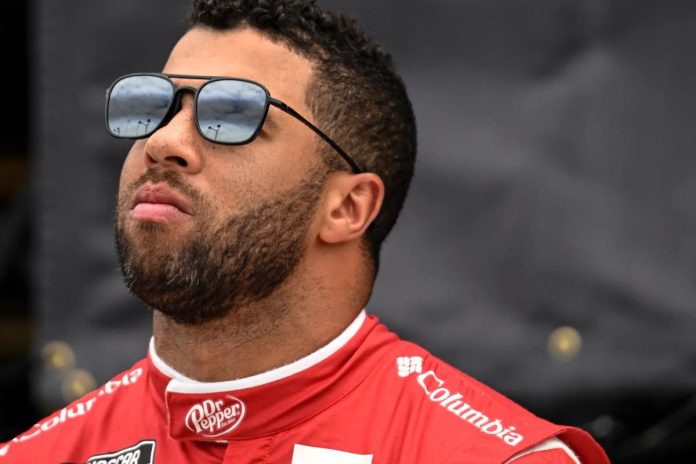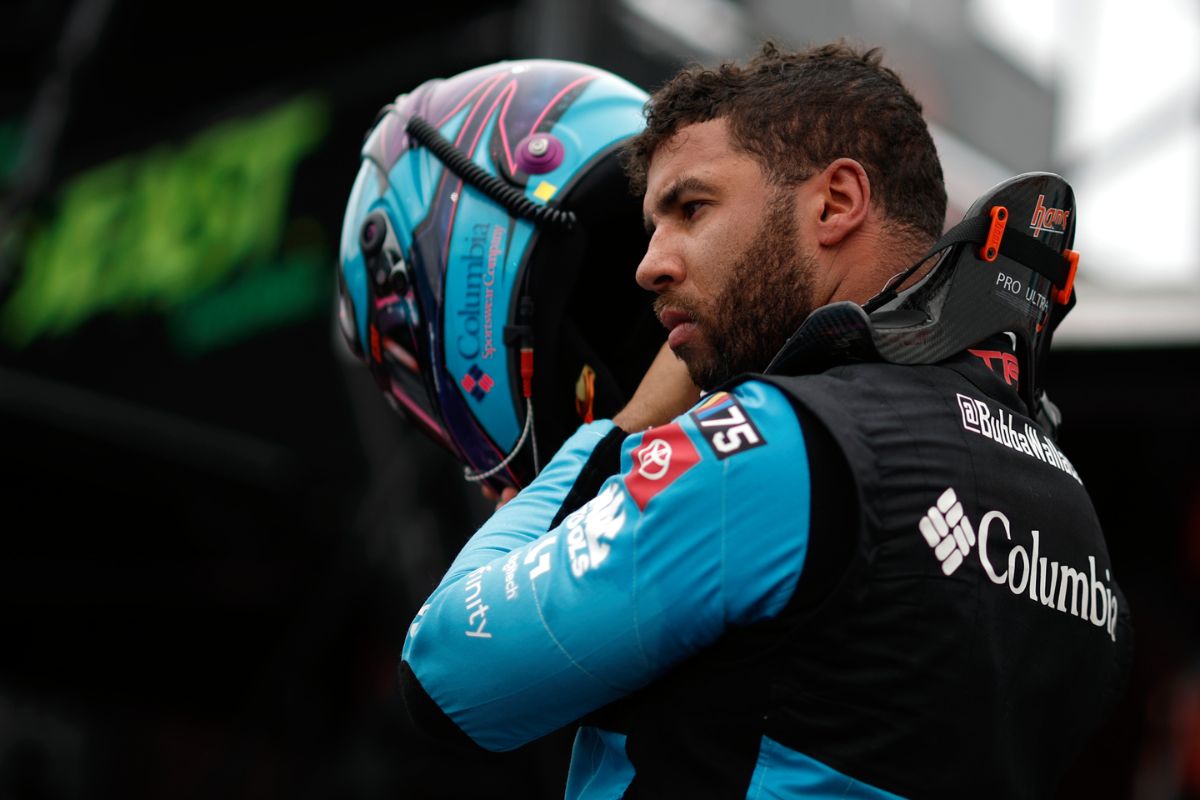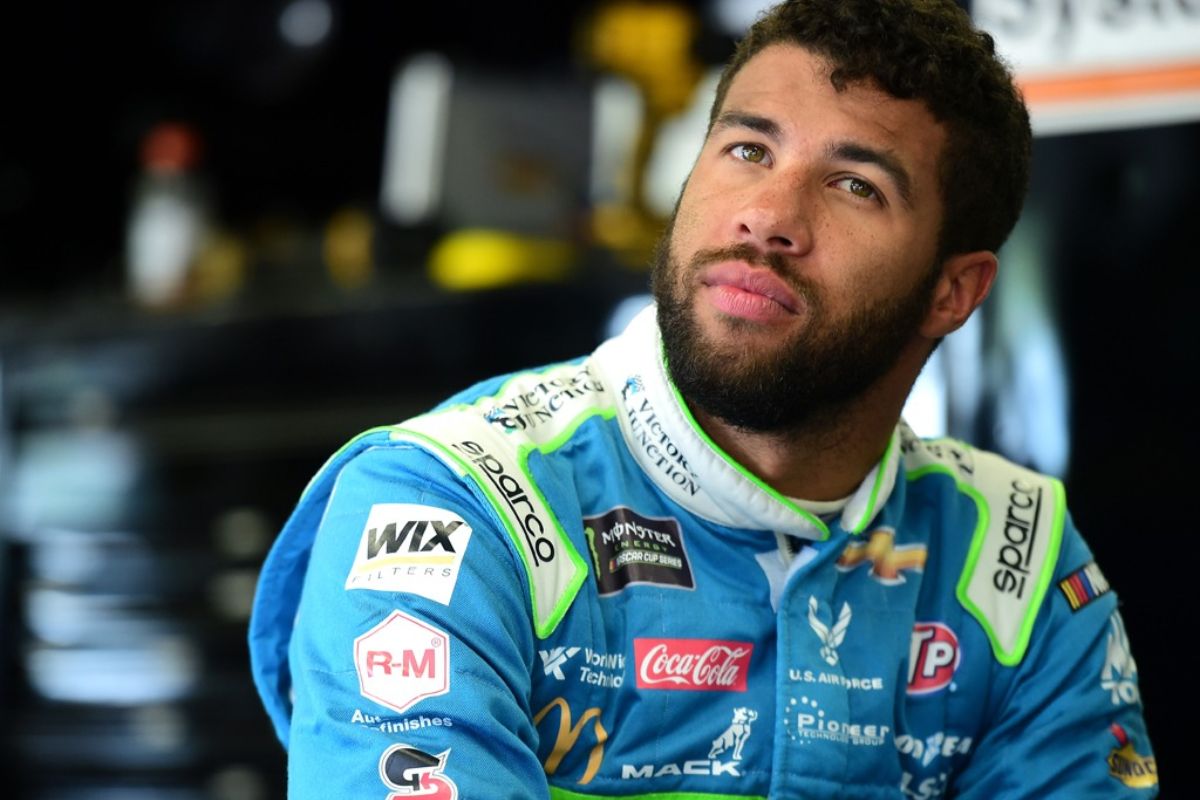Wallace’s Mental Battle: Bubba Wallace encountered not just physical competitors but also the strong within—his own mental and emotional hurdles. The incidents with Chase Briscoe and Harrison Burton were not just mere interruptions in an otherwise strategic race; they were tests of Wallace’s psychological fortitude. Historically open about his struggles with mental health, Wallace’s response to these challenges is as crucial as any physical tactic on the track.
Key Takeaways
- Wallace faced significant mental challenges, heightening his anxiety before and during the Texas race.
- His openness about mental health issues has encouraged dialogue in sports.
- Technical discrepancies during the race exacerbated his mental strain and frustration.
- A collision with Chase Briscoe and Harrison Burton disrupted his strategic focus and emotional balance.
- Despite the setbacks, Wallace views the experience as a learning opportunity for future races.
Bubba Wallace’s Texas Track History
Bubba Wallace has consistently demonstrated impressive skill at Texas Motor Speedway, although his recent appearance was overshadowed by a high-stakes confrontation. Historically, Wallace’s performances at this venue have been marked by tactical expertise and a resolve to maximize his race strategy. In the previous year’s playoff race, Wallace’s skill was particularly evident as he dominated a significant portion of the race, displaying not only his driving abilities but also his capacity to contend under intense circumstances.
Throughout that event, Wallace skillfully navigated his vehicle through the pack, maintaining a position at the forefront of the race. His ability to lead was not simply a reflection of his driving but also of the meticulous preparation and team strategy laid out before the engines roared to life.
Wallace found himself embroiled in a heated duel with Chase Briscoe, a confrontation that demanded split-second decisions and highlighted the razor-thin margins between success and shortfall in professional racing.
Mental Struggles Before the Texas Race
While Wallace’s prior performances at Texas Motor Speedway highlighted his strategic skills, he openly acknowledged the mental challenges he faced as he prepared for the latest race. The anticipation of the event, combined with the stress to perform at a track where he has historically shown expertise, compounded his anxiety. Wallace’s admission sheds light on the often overlooked aspect of motorsport.
Wallace’s struggle is not just about the physical demands of racing but also the mental resilience needed to navigate through a wreck-riddled race such as Texas. Each lap around the speedway is not only a test of speed and agility but also of mental strength. The racer must maintain concentration amidst the chaos, anticipating moves from competitors while managing his own strategic decisions.
Before even starting his engine, Wallace had to align his mental state to confront these challenges. This preparation involves more than reviewing tactical plans or discussing race strategy with his team.
Openness About Mental Health Challenges
Wallace’s open discussions about his mental health challenges have marked a significant shift in how athletes address such personal issues publicly. His openness has not only highlighted his personal struggles but also encouraged a broader conversation about mental health in sports, an area where such topics were once considered taboo.
“We definitely made a step up into it last year, when we made the playoffs…I was like, ‘Hey, good job’…Obviously, you show up and think everything’s gonna be the exact same. Nahh. We over-adjusted…we followed what the 45 was doing. We showed up to the track the exact same. And then we made a couple of adjustments every week”.-(WALLACE)
Since his time with Richard Petty Motorsports and throughout his tenure with 23XI Racing, Wallace has been vocal about his mental health, emphasizing its importance with the same intensity one would expect in discussions about physical fitness. This transparency has served as a guiding light for many, signaling that mental wellness is as crucial as physical health, and that speaking out is not a sign of weakness but of profound strength.
- Awareness and Disillusion: By sharing his experiences, Wallace has played a crucial role in destigmatizing mental health issues within the athletic community and beyond.
- Encouragement for Others: His openness provides motivation to fellow athletes and fans, who may be struggling silently, to seek help and speak openly.
Technical Challenges and Mental Blocks During the Race
During the Texas race, technical challenges and mental blocks greatly impeded Wallace’s performance, as discrepancies between his sensory experiences in the car and the objective data provided by his team intensified his frustration. This non-alignment created a complex situation where Wallace struggled to adjust his driving to align with the analytical feedback.
The car’s handling, a critical aspect in racing, is typically fine-tuned to a driver’s preference and the track’s demands. In Wallace’s case, his perceptions did not match the telemetry data, indicating either a misinterpretation of the sensory input or perhaps an overlooked variable in the car’s setup. This misalignment is not uncommon in racing, but its resolution is crucial.
Moreover, this scenario placed Wallace in a mental mess, challenging his resilience and adaptability. Racing, while intensely physical, is equally a mental endeavor. The psychological strain of doubting one’s senses while managing high-speed maneuvers can be overwhelming.
On-Track Incidents and Frustrations
Amidst the high intensity of the race, Wallace found himself embroiled in a contentious incident with Chase Briscoe, escalating existing tensions and complicating his strategic actions on the track. As the laps progressed, the fierce competition led to a collision involving Wallace, Briscoe, and Harrison Burton, effectively extinguishing Wallace’s aspirations for a top 5 finish.
“I’m getting pissed off ’cause we keep restarting 10th to 12th…The 14 sticks his nose into 1 and the 10 doesn’t know that they were three-wide. We made contact, and I’m up by the wall. So of course I lose it. ‘I’m tired of restarting f***ing restarts right? Do something to get us track position.’ Well, we weren’t good enough to do that”.-(wallace)
The complexities of this race were not just about the physical actions but also about the mental and emotional resilience required to handle high-pressure situations. Wallace’s reaction post-race was one of palpable frustration, which was understandable given the stakes and his significant progress from P22 into the top 10 before the incident.
A three-wide battle for the lead! Bubba Wallace gets loose and triggers a crash with Chase Briscoe. pic.twitter.com/3B2LhahhpX
— FOX: NASCAR (@NASCARONFOX) April 14, 2024
- Collision Complexity: Wallace’s encounter with Briscoe and Burton not only affected his track position but also had implications for his strategy moving forward in the race.
- Emotional Impact: The incident visibly affected Wallace’s composure, challenging his ability to maintain focus amid adversity.
- Strategic Disruption: The collision forced a reassessment of tactics at a critical moment, diverting resources to damage control rather than race optimization.
News in Brief: Wallace’s Mental Battle
The incidents at the Texas race emphasize Bubba Wallace’s intricate interplay between technical skill and mental resilience. Despite the disruptions caused by collisions, Wallace’s open discourse on mental health challenges shows a path forward not only for himself but for the sport at large.
This honesty, coupled with a strategic response to setbacks, exemplifies a growth mindset essential for overcoming future adversities. Such resilience serves as a beacon for athletes facing similar psychological battles in high-stakes sports.
Our Reader’s Queries
Q. What was Bubba Wallace famous for?
A. A product of the NASCAR Drive for Diversity program, Bubba Wallace initially made waves in 2013 by securing a historic victory in NASCAR’s Truck Series, becoming the first African-American in half a century to achieve such a feat. This victory marked the beginning of Wallace’s impressive journey, ultimately leading to six notable wins in the NASCAR Truck Series.
Q. What did Bubba Wallace’s dad do?
A. Born in Mobile, Alabama, and raised in Concord, North Carolina, Bubba Wallace hails from a diverse background. His parents, Darrell Wallace Sr. and Desiree Wallace, represent a blend of cultures and professions. His father, Darrell Wallace Sr., is the proprietor of an industrial cleaning company, while his mother, Desiree Wallace, brings her expertise as a social worker who once excelled in track at the University of Tennessee.
Q. What is Bubba Wallace salary?
A. Bubba Wallace earns a yearly salary of $2.2 million as a driver for 23XI Racing.
ALSO READ: Bubba Wallace’s Cup Series Happiness: Breaking Free From Karma’s Shadow!





